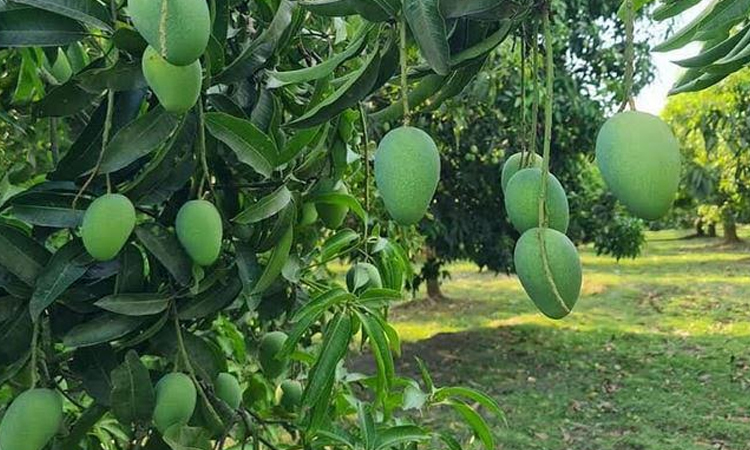News Flash
News Flash

By Md Aynal Haque
RAJSHAHI, Oct 18, 2025 (BSS) - As groundwater levels continue to decline and drought conditions persist, farmers in the Barind region are increasingly adopting crop diversification strategies focused on low-water-consuming and high-value crops to build resilience against climate change and water stress.
Experts said the shift from traditional irrigation-intensive crops such as Irri-Boro paddy to wheat, maize, lentils, chickpeas, and oilseeds - alongside fruits like mango, guava, malta, and dragon fruit - is improving water efficiency, enhancing farmer incomes, and supporting sustainable agriculture in one of the country's most climate-vulnerable zones.
Agricultural specialist Monzurul Huda, former director of the Department of Agricultural Extension (DAE), said the primary aim of this transition is to mitigate water scarcity in the Barind tract, which historically depends on rain-fed and groundwater irrigation.
"The Barind region is gradually becoming a hub for high-value and water-smart crops. Expanding the acreage of drought-tolerant varieties is essential for sustaining agriculture in this area," he said.
Huda noted that traditional fruits such as mango, guava, and orange are now being cultivated alongside newer, commercially viable fruits like dragon fruit, which is gaining popularity for its health benefits and export potential.
Farmers have also moved away from the conventional single-cropping pattern. Over the past few years, many have adopted diversified farming practices that support a wider range of vegetables and fruit cultivation across the Barind tract.
According to experts, large-scale promotion of diversified crop farming is a key strategy to ensure water security and reduce pressure on underground sources in the drought-prone zone.
Although Barind has long been characterized by arid conditions, farmers in earlier times adapted by growing less water-intensive indigenous crops and using surface water from rivers, canals, and ponds. However, these surface water sources are now under threat.
Prof Chowdhury Sarwar Jahan of the Department of Geology and Mining at Rajshahi University said natural surface water bodies in Barind are increasingly endangered due to unplanned usage and environmental degradation.
With surface water drying up, farmers have become heavily dependent on groundwater - especially for Irri-Boro rice - which is one of the most water-intensive crops in the region.
"Reducing groundwater extraction is imperative as the future of agriculture in Barind depends on sustainable water use amid intensifying climate threats," Prof Jahan said.
He advocated for nature-based and integrated water resource management solutions that consider political, social, and environmental realities.
He also emphasized the need to transition toward drought-tolerant crops to lessen dependence on high-irrigation agriculture.
Echoing similar views, National Agriculture Award-winning farmer Nur Muhammad said there is vast potential for expanding the cultivation of low-water-consuming crops such as gram, wheat, maize, barley, lentil, and chickpea in Barind.
"Climate change is accelerating at an alarming rate, threatening traditional crop patterns and food security. Diversification is no longer optional," he warned.
Muhammad stressed that the rights of farmers must be protected, and policy support enhanced, to encourage more widespread adoption of sustainable agricultural practices and meet growing food demands.
He added that farmers are already experiencing tangible benefits from diversified cropping - including increased incomes and new employment opportunities in agriculture.
Crop diversification not only helps ensure food security by reducing dependence on a single crop, but also strengthens the agricultural sector's resilience to climate shocks.
Sub-Assistant Agriculture Officer Atanu Sarker said the ongoing decline in the groundwater table poses a major challenge, making the switch to less water-intensive crops critical for long-term sustainability.
"Diversification is an adaptive strategy that must be scaled up to safeguard the future of Barind's agriculture," he added.
Coordinator (Barind Region) of the Bangladesh Resource Centre for Indigenous Knowledge (BARCIK), Shahidul Islam stressed the need for sustainable agriculture practices aligned with the Sustainable Development Goals (SDGs).
"Conserving species diversity and ensuring water security are both essential for biodiversity, food security, and overall sustainable development," he said.
He warned that the adverse impacts of climate change and other natural calamities are already posing serious threats to biodiversity, water resources, and health security in the Barind area.